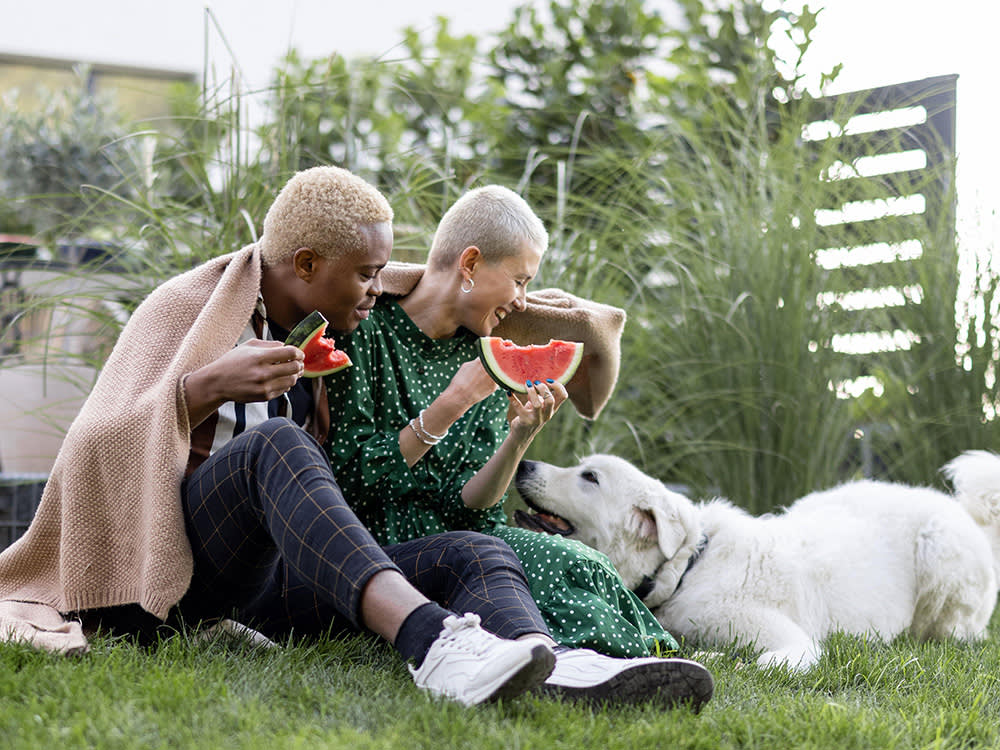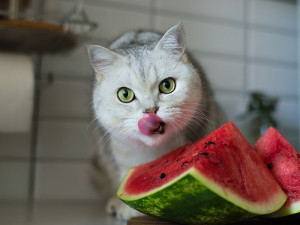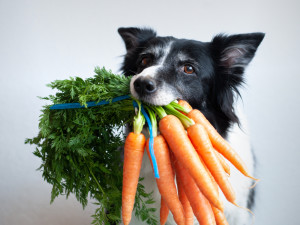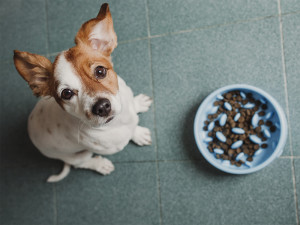Can Your Dog Eat Watermelon?
Yep, you can share watermelon with your pup – but there are a few safety tips to keep in mind

Share Article
Most people can agree that a juicy slice of watermelon makes a refreshing snack, especially in summer. What if your dog wants to be one of the cool kids and snack on watermelon, too? Can your dog eat watermelon with you? Yes, but in moderation, and with proper preparation.
Nutrition facts: watermelon for dogs
Watermelons are more than 90 percent water, making them a great way to help stay hydrated. They are low in calories and high in vitamins and antioxidants. Watermelon is one of the best natural sources of lycopene, which is considered a powerful antioxidant. Watermelon is also a good source of Vitamins A, B and C. Potassium and magnesium, two essential minerals, are also present in high quantities.
Is watermelon good for dogs?
While properly prepared watermelon isn’t toxic to dogs, it has not been proven to be beneficial to them either. Watermelon’s low-calorie count and high water content make it a better treat option than other fruits, but that doesn’t mean that it’s great for all dogs. This sweet fruit is full of natural sugars. Dogs who are overweight or diabetic should not be fed watermelon or other sugary treats. Dogs with sensitive gastrointestinal tracts may not tolerate watermelon very well either. Even if your dog craves delicious watermelon pieces, the amount should be kept in moderation.
Can dogs eat watermelon seeds or rinds?
Dogs should not eat watermelon seeds or rinds, so feeding watermelon to your dog takes a little bit of preparation. Before offering watermelon to your dog, be sure to remove all of the seeds. Seeds can be a choking hazard in small dogs and can also cause some stomach upset. Watermelon seeds also contain cyanide. While it’s highly unlikely that any dog would ingest enough seeds to cause toxicity, it’s best to remove the seeds first.
Dogs should not eat watermelon rinds, either. The rinds are tough to chew and do not digest completely, putting dogs at risk for developing intestinal obstruction if swallowed. When preparing watermelon for your dog, remove the seeds and the rind before offering small amounts of the flesh.
Is watermelon completely safe for dogs?
Most dogs can be fed small pieces of watermelon flesh without any issues. Dogs who are sensitive to diet changes or dogs who need to have restricted sugar intake should not be given watermelon. Consult your veterinarian first if you have any questions or concerns with any new food or treat.
The bottom line: can dogs eat human food?
There are many human foods that dogs can eat safely. Best practice is to consult your veterinarian before offering human foods to ensure that they are non-toxic and safe for your dog. At the very least, perform a thorough internet search using reputable sites like the ASPCA Animal Poison Control websiteopens in new tab.
Human food and other treats should not make up more than 10 percent of your dog’s diet, so moderation is key. Overloading your dog on snacks can lead to obesity, diabetes, or imbalanced nutrition. If your dog does not tolerate treats or diet changes well, just skip them.
Other fruits that are good/safe for dogs
Blueberries: blueberries and watermelon have a lot in common. They are both low in calories, high in antioxidants, and freezing them can make fun, crunchy, dog-safe treats.
Apples: dogs who favor crunchy snacks can enjoy fiber-rich apples. Like watermelon, they require a little preparation — be sure to remove the seeds and the core. Avoid feeding large chunks to dogs who are likely to swallow their apple snacks whole.
Bananas: bananas are also a safe treat for dogs. These tend to be on the sugary side (especially the really ripe ones), so feed them in moderation. And don’t give dogs banana peels.
Other fruits that are dangerous
Grapes: grapes and raisins are toxic to dogs. They contain a toxin called tartaric acid and can cause kidney failure in some dogs.
Cherries: Dogs should not be fed cherries. Cherry pits, stems, and leaves all contain cyanide. The pits are also a choking hazard and can cause intestinal obstruction in smaller dogs. While the flesh of cherries are not toxic to dogs, they contain high levels of sugar that tend to cause gastrointestinal upset.
Avocado: dogs should not eat avocados. Avocado pits, leaves, and stems all contain persin, a toxin that can cause severe vomiting and diarrhoea. Avocado pits can also cause intestinal obstruction. Avocado pulp is not toxic to dogs, but it is very fatty, potentially causing gastrointestinal upset or pancreatitis.
Frequently asked questions
Can dogs eat watermelon?
Dogs can eat watermelon as long as the seeds and rind are removed first.
How much watermelon can a dog eat?
Watermelon is full of natural sugars and should be fed in moderation. Treats (even fruit) should not make up more than 10 percent of your dog’s diet.
Is watermelon good for dogs?
Although properly prepared (seeds and rind removed) watermelon isn’t toxic to dogs, it has not been proven to be beneficial to them either.
Can dogs eat watermelon rinds?
Dogs should not eat watermelon rinds because they are a choking hazard and can cause intestinal obstruction.
Is watermelon safe for dogs?
Watermelon flesh is safe for dogs to eat. Watermelon seeds and rind should be removed before offering the fruit to a dog.
References
Note: while caution was taken to give safe recommendations and accurate instructions in this article, it is impossible to predict an individual dog’s reaction to any food or ingredient. Readers should consult their vets and use personal judgement when applying this information to their own dogs’ diets.

Dr. Alycia Washington, DVM, MS
Alycia Washington, DVM, is a small animal emergency veterinarian with over ten years of experience based in North Carolina. She works as a relief veterinarianopens in new tab and provides services to numerous emergency and specialty hospitals. She also works as a veterinary writer with a focus on educating pet owners, and is the author, under the name A. C. Washington, of the children’s book Dr. Jett, Monster Vet.
Related articles
![Cheerful Brunette Having Fun With Her Dog Outside]()
Big Fish: The Best Omega-3 Supplements for Dogs (And Why They Need Them)
Fatty acids rev up your dog’s energy, keep their coat shiny, help with inflammation from allergies and arthritis, and so much more
![Dog biting into a bunch of carrots]()
How to Give Your Dog the Vitamins and Minerals They Need
Your pup needs their greens, too
![A person giving a banana to a dog.]()
10 Fruits and Vegetables That Your Dog Can Feast On
Indulge your dog (safely) with these delicious and healthy snacks
![A woman smiling at her dog while carrying a bowl of food.]()
Is Yoghurt Good For Your Dog?
It’s safe and healthy, and most dogs love it
![Young blonde woman with a Jack Russell puppy during spring in the city.]()
Dog Training Treats They Will Sit, Stay – You Name It – For
A behaviourist reveals the most mouth-watering treats for training your pup
![Puppy looks up while sitting next to a puzzle toy with food.]()
Tips to Slow Down a Dog Who Eats Too Fast
Eating fast is more than just unsightly – it’s potentially dangerous









